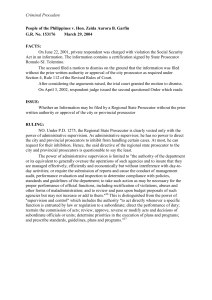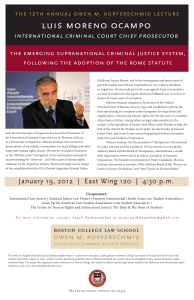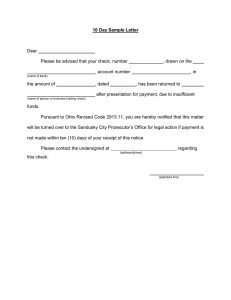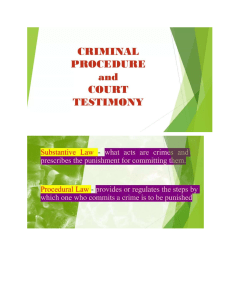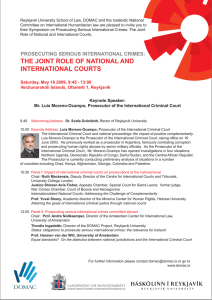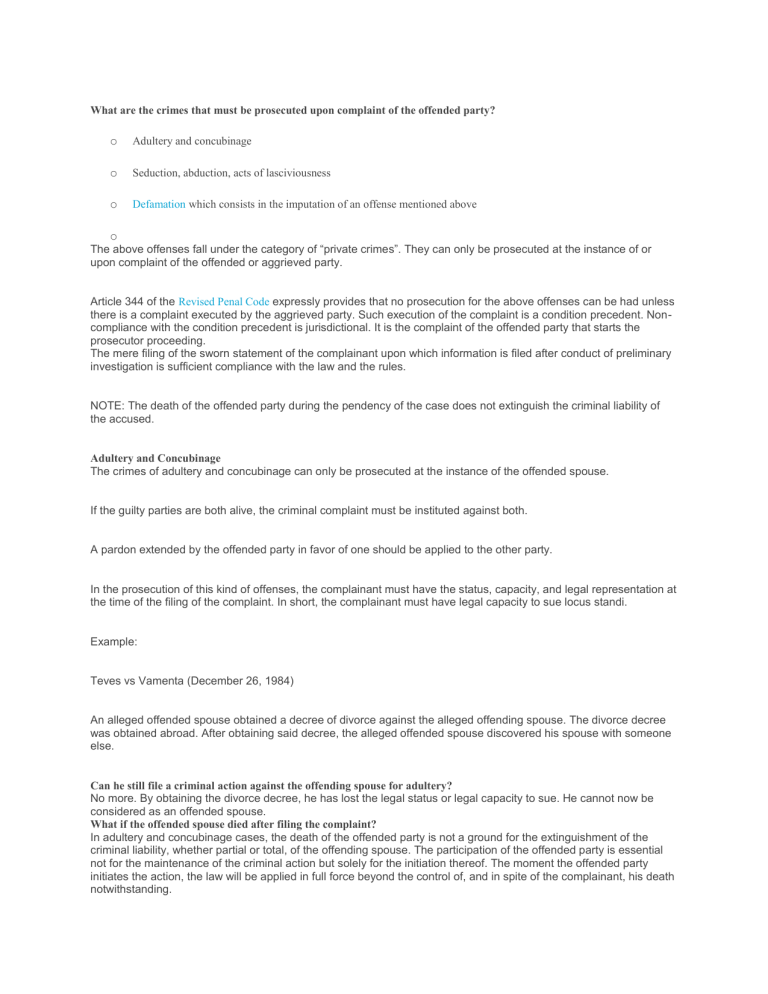
What are the crimes that must be prosecuted upon complaint of the offended party? o Adultery and concubinage o Seduction, abduction, acts of lasciviousness o Defamation which consists in the imputation of an offense mentioned above o The above offenses fall under the category of “private crimes”. They can only be prosecuted at the instance of or upon complaint of the offended or aggrieved party. Article 344 of the Revised Penal Code expressly provides that no prosecution for the above offenses can be had unless there is a complaint executed by the aggrieved party. Such execution of the complaint is a condition precedent. Noncompliance with the condition precedent is jurisdictional. It is the complaint of the offended party that starts the prosecutor proceeding. The mere filing of the sworn statement of the complainant upon which information is filed after conduct of preliminary investigation is sufficient compliance with the law and the rules. NOTE: The death of the offended party during the pendency of the case does not extinguish the criminal liability of the accused. Adultery and Concubinage The crimes of adultery and concubinage can only be prosecuted at the instance of the offended spouse. If the guilty parties are both alive, the criminal complaint must be instituted against both. A pardon extended by the offended party in favor of one should be applied to the other party. In the prosecution of this kind of offenses, the complainant must have the status, capacity, and legal representation at the time of the filing of the complaint. In short, the complainant must have legal capacity to sue locus standi. Example: Teves vs Vamenta (December 26, 1984) An alleged offended spouse obtained a decree of divorce against the alleged offending spouse. The divorce decree was obtained abroad. After obtaining said decree, the alleged offended spouse discovered his spouse with someone else. Can he still file a criminal action against the offending spouse for adultery? No more. By obtaining the divorce decree, he has lost the legal status or legal capacity to sue. He cannot now be considered as an offended spouse. What if the offended spouse died after filing the complaint? In adultery and concubinage cases, the death of the offended party is not a ground for the extinguishment of the criminal liability, whether partial or total, of the offending spouse. The participation of the offended party is essential not for the maintenance of the criminal action but solely for the initiation thereof. The moment the offended party initiates the action, the law will be applied in full force beyond the control of, and in spite of the complainant, his death notwithstanding. What if one of the accused died in adultery or concubinage cases? The death of one of the accused after a complaint for concubinage or adultery has been filed by the offended spouse does not affect the prosecution against the surviving accused. Seduction, Abduction, Acts of Lasciviousness The crimes of seduction, abduction, and acts of lasciviousness may be prosecuted upon complaint of the offended party or her parents, grandparent, or guardian. The principle applicable here is parens patriae. (Note that this principle is not applicable to adultery and concubinage cases because in the latter cases, they can only be prosecuted at the instance of the offended spouse.) NOTE: If the offended party is already of age, she has the exclusive right to file the complaint unless she becomes incapacitated. The parents, grandparents, and guardian only have exclusive, successive authority to file the case if the offended party is still a minor. What if the offended party is a minor? In cases of seduction, abduction, and acts of lasciviousness where the victim is a minor, the rule is that the minor may still initiate the prosecution of the case independent of her parents, grandparents, or guardian. Where the offended party who is a minor cannot file the complaint by reason of her incapacity other than her minority, the parents, grandparents or guardian may file the complaint. In such case, the right to file the complaint shall be successively and exclusively exercised by said relatives. In criminal actions where the civil liability includes support for the offspring, the application for support pendente lite may be filed successively by the offended party, her parents, grandparents, or guardian, and even the State in the corresponding criminal case during its pendency. What if the offended party is incapacitated or incompetent? In cases of seduction, abduction, and acts of lasciviousness where the victim is incapacitated or otherwise incompetent, the complaint may be filed in her behalf by her parents, grandparents, or guardian. If the offended party dies or becomes incapacitated before she could file the necessary complaint, and she has no known parents, grandparents, or guardian, the State shall initiate the criminal action in her behalf. Defamation involving the imputation of adultery, concubinage, abduction, seduction, or acts of lasciviousness This may only be prosecuted at the instance of the offended party. There is no successive or exclusive initiation of criminal complaint in this instance unlike in the other private crimes. The offended party must initiate the complaint herself or himself. What is the distinction between the control by the prosecution and the control by the court? Before a case is filed in court, the prosecution has control over the following: (WWMR) o What case to file o Whom to prosecute o The manner of prosecution o The right to withdraw the case before arraignment even without notice and hearing. After a case is filed in court, the court has control over the following: (TRPDD) o The suspension of arraignment o Reinvestigation o Prosecution by the prosecutor o Dismissal o Downgrading of the offense or dropping of the accused even before plea May criminal prosecutions be restrained? The general rule is that no criminal prosecution may be restrained or stayed by any injunctive writ, preliminary or final. Public interest requires that criminal acts be immediately investigated and prosecuted for the protection of the society. Can a prosecutor be compelled to file a particular complaint or information? No. A prosecutor is under no compulsion to file a particular criminal information where he is not convinced that he has evidence to support the allegations thereof. Neither an injunction, preliminary or final, nor a writ pf prohibition may be issued by the courts to restrain a criminal prosecution except in the extreme case where it is necessary for the courts to do so for the orderly administration of justice or to prevent the use of the strong arm of the law in an oppressive and vindictive manner. The exercise of such judgment and discretion may generally not be compelled by mandamus, except if the prosecutor shows evident bias in filing the information and refuses to include a co-accused without justification. But before filing for mandamus to compel a fiscal to include another co-accused in the information, the party must first avail himself of other remedies such as the filing of a motion for inclusion. Instances when an injunctive writ may issue: o To afford protection to the constitutional rights of the accused. o If it is necessary to the orderly administration of justice or to avoid oppression or multiplicity of suits. o To avoid threatened and unlawful arrest. o If there is double jeopardy. o If there is clearly no prima facie case. o If the acts of the officer are without or in excess of authority. o When there is a prejudicial question. o When the prosecution is under an invalid law. Instances when a writ of certiorari may be available in criminal actions: o When necessary to afford adequate protection to the constitutional rights of the accused. o When necessary for the orderly administration of justice or to avoid oppression or multiplicity of actions. o When there is a pre-judicial question which is sub-judice. o When the acts of the officer are without or in excess of authority. o Where the prosecution is under an invalid law, ordinance, or regulation. o When double jeopardy is clearly apparent. o Where the court has no jurisdiction over the offense. o Where it is a case of persecution rather than prosecution. o Where the charges are manifestly false and motivated by the lust of vengeance. o When there is clearly no prima facie case against the accused and a motion to quash on that ground has been denied. In case of conflict of views between the judge and the prosecutor, whose view should prevail? In a clash of views between the judge who did not investigate and the prosecutor who did, or between the prosecutor and the offended party or the defendant, those of the prosecutor’s should normally prevail. To whom should you appeal the decision of the prosecutor? The decision of the prosecutor may be modified by the Secretary of Justice or in special cases by the President of the Philippines. What is the effect of lack of intervention by the prosecutor in criminal prosecutions? Ordinarily, the proceedings had thereon without the participation of the government prosecutor may be considered a nullity. However, a private prosecutor may be allowed to prosecute the case under the authority, supervision and control of the government prosecutor. And provided all actions, pleadings or motions filed by the private prosecutor is with prior approval of the government prosecutor. Note that a private prosecutor may be given the authority to prosecute a criminal action in the event that the public prosecutor has been loaded with a heavy work schedule or if there is a lack of public prosecutors. The authorization shall be in writing by the Chief of the Prosecution Office or the Regional State Prosecutor subject to the approval of the court (Pursuant to A.M. No. 02-2-07-SC, May 1, 2002). Is the prosecutor required to be physically present in the trial of a criminal case? According to People v. Beriales (1976 case), he should be present. If he is not physically present, it cannot be said that the prosecution was under his direction and control. But in People v. Malinao and Bravo v. CA, it was held that the proceedings are valid even without the physical presence of the Fiscal who left the prosecution to the private prosecutor under his supervision and control. Who prosecutes the criminal action in the absence of the prosecutor? In the MTC, when the prosecutor assigned is absent or not available, the offended party, any peace officer or public officer charged with the enforcement of the law violated may prosecute the case. Such authority ceases upon the intervention of the prosecutor or when the case is elevated to the RTC. After the case is filed in court, to whom should a motion to dismiss be addressed? Once the information is filed in court, the court acquires jurisdiction. Whatever disposition the prosecutor may feel should be proper in the case thereafter should be addressed for the consideration of the court, subject only to the limitation that the court should not impair the substantial rights of the accused or the right of the people to due process. Who acts on a motion for reinvestigation of the case after the filing of the information? A motion for reinvestigation should, after the court has acquired jurisdiction over the case, be addressed to the trial judge and to him alone. The Secretary of Justice, the State Prosecutor, or the city prosecutor may not interfere with the judge’s disposition of the case, much less impose upon the court their opinion regarding the guilt or innocence of the accused once the information is filed in court, the latter being the sole judge therof. Once a complaint or information is filed in court, any disposition of the case as to its dismissal or the conviction or the acquittal of the accused rests upon the sound discretion of the court. It does not matter if it is done before or after the arraignment of the accused or that the motion is filed after a reinvestigation or upon instructions of the Secretary of Justice. Although the prosecutor retains the direction and control of the prosecution of criminal cases even when the case is already in court, he cannot impose his opinion on the trial court. The court is the sole judge on what to do with the case before it. The manner of terminating the case is within its exclusive jurisdiction and competence. A motion to dismiss the case filed by the prosecutor should be addressed to the court who has the option to grant or deny the same. If, after he has filed the case, the prosecutor thinks that a prima facie case exists, can he refuse to prosecute? No, he cannot refuse to prosecute. He is obliged by law to proceed and prosecute the criminal action. He cannot impose his opinion on the court. What are the limitations on the control by the Court? (SINNATRa) o The Court has authority to review the Secretary’s recommendation and reject if it there is grave abuse of discretion. o To reject or grant a motion to dismiss, the court must make its own Independent assessment of the evidence. o Prosecution is entitled to Notice of hearing. o Judgment is void if there is No independent assessment and finding of grave abuse of discretion. o The Court must Await the result of a petition for review. o The ultimate Test of the court’s independence is where the prosecutor files a motion to dismiss or withdraw the information. o The prosecution’s stand to maintain prosecution should be Respected by the court. KEY CODE: SINNATRa When is a complaint required? A sworn written complaint is required if the offense is o one which cannot be prosecuted de officio, or o is private in nature (adultery, concubinage, abduction, seduction, acts of lasciviousness, defamation consisting in the imputation of any of the above offenses), or o where it pertains to those cases which need to be endorsed by specific public authorities (Anti-Dummy Board with respect to the Anti-Dummy Law, National Water and Air Pollution Control Commission with respect to the Anti- Pollution Law). What is deemed included in the designation of the offense? It includes all the essential elements composing the offense committed together with the qualifying and aggravating circumstances that attended the commission of the offense. Matters of evidence need not be alleged in the complaint or information. What is the scope of the act or omission subject of the complaint or information? This refers to the cause of accusation. Every person accused of an offense is entitled to be duly informed of the nature and the cause for which he is charged. The actual recital of the facts as alleged in the body of the information constituting the gravamen of the offense for which the accused is apprised of the charge against and not the designation in the title. This involves, under the new rules, the inclusion in the information not only the essential elements of the offense charged but also the modifying circumstances attendant in the commission of the offense. It is therefore necessary to allege in the information the qualifying and aggravating circumstances that attended the commission of the offense. (Sec 8 & 9, Rule 110) Is the inclusion of the exact date of the commission of the offense mandatory for the validity of the information? No. Such failure to include the exact date of the commission of the crime does not render defective the information. It remains valid as long as it distinctly states the elements of the offense and the acts or omissions constitutive thereof. The exact date of the commission of a crime is not an essential element of it. It is only necessary to state the exact date and time of the commission of the offense when the same is an essential ingredient of the crime charged. It is enough to allege that the crime was committed at any time as near to the actual date on which the crime was committed. What is the meaning of the term “Direction and Control” of the prosecutor over the prosecution of criminal actions? It simply means that the institution of a criminal action depends upon the sound discretion of the prosecutor, he may or may not file the complaint or information, follow or not follow that presented by the offended party, according to whether the evidence, in his opinion is sufficient or not to establish the guilt of the accused beyond reasonable doubt. What is the reason for giving the control and supervision to the prosecutor? The reason for placing the criminal prosecution under the direction and control of the prosecutor is to prevent malicious or unfounded prosecution by private persons. The prosecution of the criminal action cannot be controlled by the complainant. Prosecuting officers under the power vested in them by law, not only have the authority but also the duty of prosecuting persons who, according to the evidence received from the complainant, are shown to be guilty of the crime committed within the jurisdiction of their office. They have equally the legal duty not to prosecute when after an investigation they become convinced that the evidence adduced is not sufficient to establish a prima facie case. In the Regional Trial Court, the prosecution of cases must be under the direction and control of the government prosecutor. Is there a limitation on the power of discretion and control? Yes. The power of the prosecutor is not without limitation or control. The same is subject to the approval of the provincial or city fiscal or the chief state prosecutor as the case maybe. The resolution of the prosecutor maybe elevated for review to the Secretary of Justice who has the power to affirm, modify, or reverse the action or the opinion of the prosecutor. Consequently, the Secretary of Jutice may direct that a motion to dismiss the case be filed in court or otherwise, that information be filed in court. The moment the prosecutor files the case in court, any matter relating to the disposition of the case shall be within the sound discretion of the court. Supposed the prosecutor believes that that the evidence is not sufficient yet his superiors think otherwise, can his superiors still compel him to prosecute? The role of the prosecutor is to see to it that justice is done and not necessarily to secure the conviction of the person accused before the courts. Thus, in spite of his opinion to the contrary, it is the duty of the prosecutor to proceed with the presentation of evidence of the prosecution to the court to enable the court to arrive at its own independent judgment as to whether the accused should be convicted or acquitted. May the courts interfere with the prosecutor’s discretion and control of criminal prosecutions? In general the courts cannot interfere with the prosecutor’s discretion and control of the criminal prosecution. It is not prudent or even permissible for a court to compel the prosecutor to prosecute a proceeding originally initiated by him on the information, if he finds that the evidence relied upon by him is insufficient for conviction. Neither has the court any power to order the prosecutor to prosecute or file the information within a certain period of time, since this would interfere with the prosecutor’s discretion and control of criminal prosecutions. A prosecutor who asks for the dismissal of the case for insufficiency of evidence has authority to do so, and courts that grant the same commit no error. The prosecutor may re-investigate a case and subsequently move for the dismissal should the re-investigation show either that the defendant is innocent or that his guilt may not be established beyond reasonable doubt.
